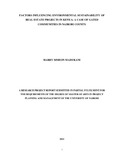| dc.description.abstract | People's lives depend on the environment as the environment contains natural resources that are vital for survival. However, human activities are degrading the environment. This is portrayed through environmental problems resulting from human activities. One domain in which environmental problems are manifested due to human activities is the housing sector.
The purpose of this study therefore was to investigate factors influencing environmental
sustainability of real estate projects in Kenya by focussing on gated communities in Nairobi
County. Nairobi County, where the study was conducted, is the largest city in Kenya with a great influx of people and high demand for housing. As such, environmental challenges resulting from real estate projects are many. Some of the environmental challenges arising from residential estates include loss of biodiversity, depletion of natural resources like flora and fauna, improper waste management and many more. This study achieved its purpose through four objectives namely environmental awareness, socio-economic factors, mitigation measures and compliance with regulatory authorities. The study reviewed literature that underpinned it through desk-top review from the global, African and local perspectives with the aim of establishing a gap which the research filled. Furthermore, this study sought to provide a conceptual framework which gave a road map and a guide to the study. The study
was a descriptive research as it investigated factors influencing environmental sustainability of real estate projects in Kenya. Therefore, a cross-sectional descriptive survey design was used. Qualitative and quantitative research methods were used for the collection and analysis of data to assess factors influencing environmental sustainability of real estate projects in Kenya. Methods of collecting data included questionnaires, interview schedules and observation check list. The data collected was analysed by a mixed method of data analysis comprising both qualitative and quantitative methods. SPSS statistical tool was used in data analysis. Recommendations were made and some conclusions were drawn from the results of
the study. The study found out that cost of equipment was the major obstacle towards
adopting technologies that enhance environmental sustainability of real estate projects in Kenya as almost 60% of respondents cited cost as a major challenge regarding adopting technologies that enhance environmental sustainability. This study concluded that most of the respondents were aware of environmental sustainability. The study however concluded that in spite of the awareness, there was lack of will to implement what people know about environmental sustainability as 100% of the tenants were aware of the difference between biodegradable and non-biodegradable types of solid waste yet only 10% were separating the two types of substances. In addition, the study established that compliance with regulations is generally good as 100% of the gated communities carried out EIA at the planning stages of the estates. This research has the potential of providing different stakeholders and regulatory authorities with information which is vital to environmental sustainability of real estate projects in Kenya. This study also has the potential of stimulating prospective researchers with desire to explore the topic further. | en |

